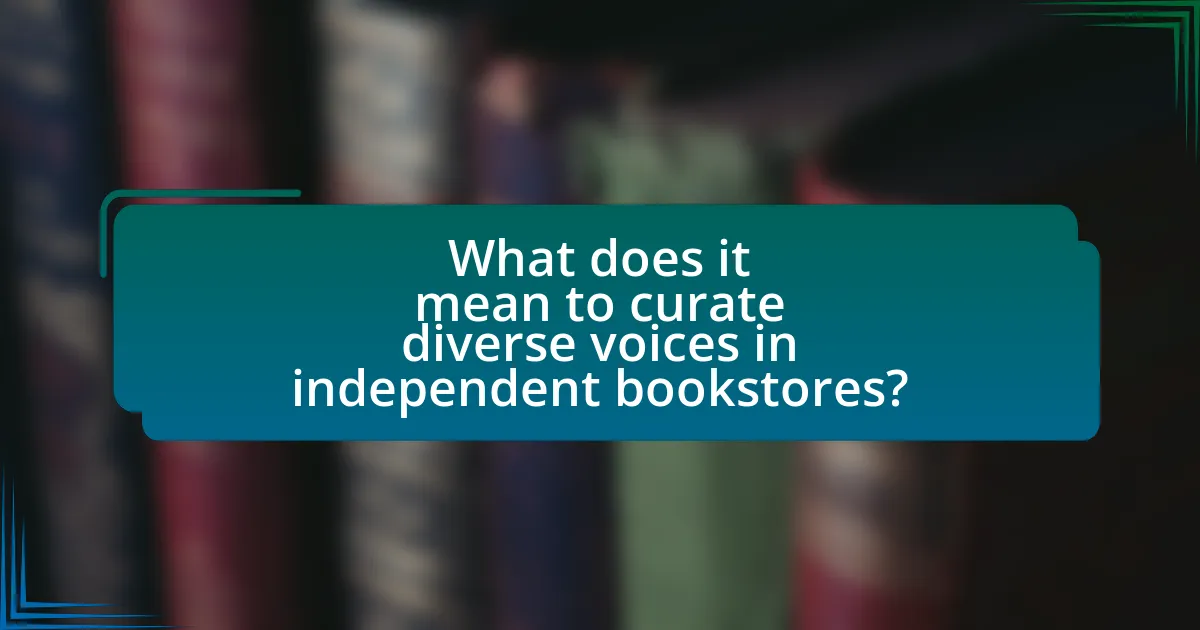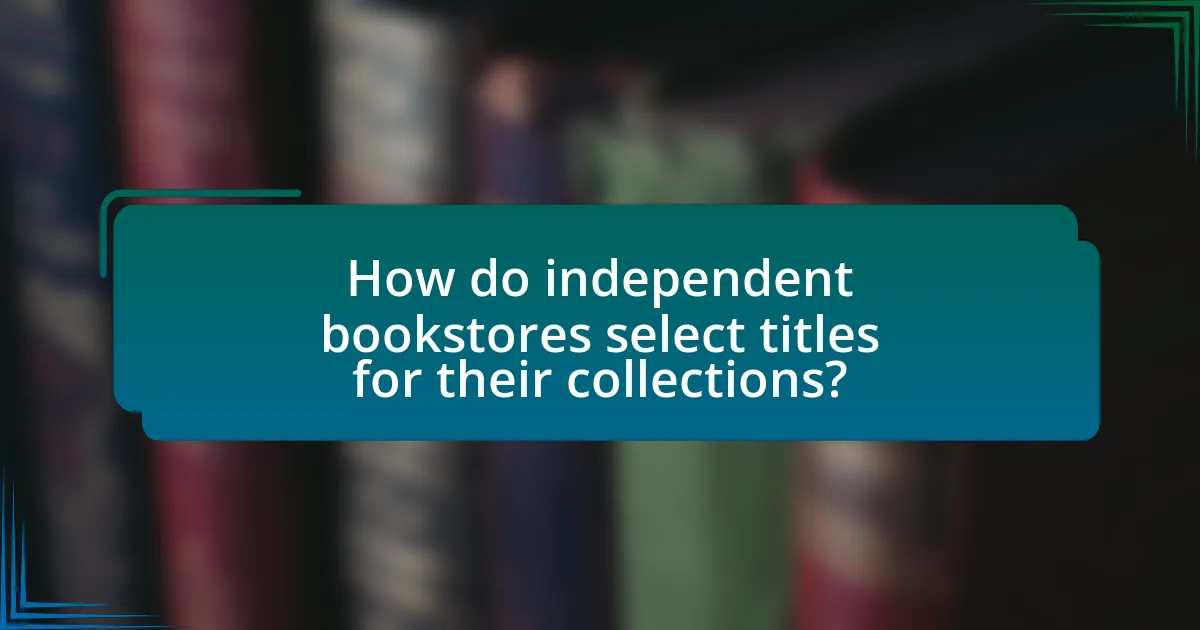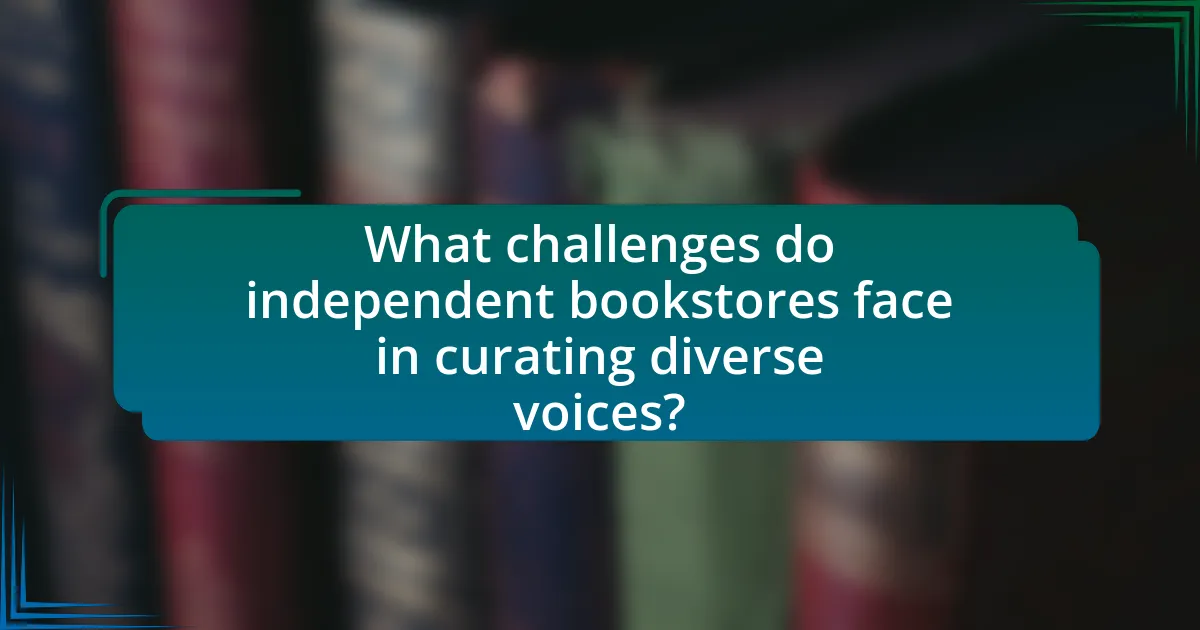Curating diverse voices in independent bookstores involves the intentional selection and promotion of books from authors representing various backgrounds, cultures, and perspectives. This practice aims to create an inclusive literary environment that reflects community diversity and enhances empathy among readers. Independent bookstores define diversity through the inclusion of marginalized voices across genres, utilizing criteria such as representation of cultural, racial, and gender identities. The article explores the challenges faced by these bookstores in curating diverse titles, the impact of financial constraints, and the importance of community engagement and staff recommendations in the selection process. Additionally, it highlights best practices for fostering relationships with diverse authors and communities to enrich the literary landscape.

What does it mean to curate diverse voices in independent bookstores?
Curating diverse voices in independent bookstores means intentionally selecting and promoting books from a wide range of authors representing various backgrounds, cultures, and perspectives. This practice aims to create an inclusive literary environment that reflects the diversity of the community and provides readers with access to a broader spectrum of ideas and experiences. Research indicates that diverse representation in literature can enhance empathy and understanding among readers, as highlighted in studies by the Cooperative Children’s Book Center, which found that only a small percentage of children’s books feature characters from diverse backgrounds. By prioritizing diverse voices, independent bookstores contribute to a richer cultural dialogue and support marginalized authors, fostering a more equitable literary landscape.
How do independent bookstores define diversity in their selections?
Independent bookstores define diversity in their selections as the inclusion of a wide range of voices, perspectives, and experiences across various genres and formats. This approach often emphasizes representation of marginalized communities, including but not limited to authors of different racial and ethnic backgrounds, LGBTQ+ identities, and varying socioeconomic statuses. For instance, many independent bookstores actively seek titles that reflect the experiences of underrepresented groups, thereby fostering a more inclusive literary landscape. This commitment to diversity is supported by initiatives such as community engagement, partnerships with local authors, and curated events that highlight diverse narratives, ultimately enriching the reading experience for their customers.
What criteria do bookstores use to assess diversity in titles?
Bookstores assess diversity in titles based on criteria such as representation of various cultural, racial, and gender identities, as well as the inclusion of different perspectives and experiences. This assessment often involves evaluating the authors’ backgrounds, the themes of the books, and the narratives presented. For instance, a study by the Cooperative Children’s Book Center found that in 2018, only 28% of children’s books published featured characters of color, highlighting the need for bookstores to actively seek out and promote titles that reflect a broader spectrum of voices. Additionally, bookstores may consider the intersectionality of identities, ensuring that titles represent not just one aspect of diversity but multiple facets, such as socioeconomic status, ability, and sexual orientation.
How does the concept of diversity vary across different bookstores?
The concept of diversity varies across different bookstores based on their selection criteria, target audience, and community engagement. Independent bookstores often prioritize local authors and underrepresented voices to reflect the demographics and interests of their communities, while larger chains may focus on mainstream bestsellers that appeal to a broader audience. For instance, a study by the American Booksellers Association found that independent bookstores are more likely to host events featuring diverse authors, thereby promoting a wider range of perspectives. This approach not only enriches the literary landscape but also fosters inclusivity within the reading community.
Why is curating diverse voices important for independent bookstores?
Curating diverse voices is important for independent bookstores because it fosters inclusivity and reflects the varied experiences of the community. By offering a wide range of perspectives, independent bookstores can attract a broader customer base, enhance cultural understanding, and promote social justice. Research indicates that diverse literature can improve empathy and critical thinking among readers, making it essential for bookstores to prioritize these voices in their selections. Furthermore, according to a 2021 report by the American Booksellers Association, bookstores that emphasize diversity in their inventory see increased sales and customer loyalty, demonstrating the economic benefits of such curation.
What impact does diversity have on community engagement?
Diversity significantly enhances community engagement by fostering inclusivity and broadening perspectives. When communities embrace diverse voices, they create environments where individuals feel valued and heard, leading to increased participation in community activities. Research indicates that diverse groups are more innovative and effective in problem-solving, as they bring varied experiences and viewpoints to discussions. For instance, a study by the National Endowment for the Arts found that communities with diverse cultural representation in arts and literature see higher levels of civic engagement and social cohesion. This correlation underscores the importance of diversity in cultivating active and engaged communities.
How does diverse curation influence customer loyalty?
Diverse curation significantly enhances customer loyalty by fostering a sense of inclusion and representation among consumers. When independent bookstores curate a wide range of voices and perspectives, they create an environment where customers feel valued and understood. This practice not only attracts a broader audience but also encourages repeat visits, as customers are more likely to return to a store that reflects their identities and interests. Research indicates that 70% of consumers are more loyal to brands that demonstrate a commitment to diversity and inclusion, highlighting the direct correlation between diverse curation and customer retention.

How do independent bookstores select titles for their collections?
Independent bookstores select titles for their collections through a combination of community engagement, personal curation by staff, and market trends. Store owners and employees often consider local interests and preferences, ensuring that the titles reflect the diverse voices and experiences of their community. Additionally, they may attend book fairs, read industry reviews, and follow publishing trends to identify popular or critically acclaimed works. This approach is supported by the fact that independent bookstores often prioritize unique and underrepresented authors, which helps to foster a more inclusive literary landscape.
What processes do bookstores follow in title selection?
Bookstores typically follow a multi-step process in title selection that includes market research, customer feedback, and collaboration with publishers. Initially, bookstores analyze sales trends and customer preferences to identify popular genres and themes. They often gather input from their clientele through surveys or direct conversations, ensuring that the titles reflect the interests of their community. Additionally, bookstores maintain relationships with publishers and distributors to receive recommendations and advance copies of upcoming titles, which helps them stay informed about new releases. This combination of data-driven insights and community engagement allows bookstores to curate a diverse and relevant selection of titles that resonate with their audience.
How do staff recommendations play a role in the selection process?
Staff recommendations significantly influence the selection process in independent bookstores by providing insights into customer preferences and trends. These recommendations are based on staff members’ expertise, personal reading experiences, and understanding of the community’s interests, which helps in curating a diverse and appealing selection of titles. Research indicates that 70% of customers are more likely to purchase a book that has been recommended by a staff member, highlighting the impact of these endorsements on sales and customer satisfaction.
What role do customer requests and feedback have in title selection?
Customer requests and feedback play a crucial role in title selection for independent bookstores. These inputs directly influence the inventory decisions, ensuring that the titles offered align with customer interests and preferences. By actively soliciting and analyzing customer feedback, bookstores can identify trends and popular genres, which helps in curating a diverse and relevant selection of titles. For instance, a study by the American Booksellers Association found that 70% of independent bookstores consider customer requests as a significant factor in their purchasing decisions, demonstrating the impact of customer engagement on title selection.
What sources do independent bookstores rely on for discovering new titles?
Independent bookstores rely on a variety of sources for discovering new titles, including publisher catalogs, industry trade shows, literary reviews, and recommendations from customers and staff. Publisher catalogs provide detailed information about upcoming releases, while industry trade shows like BookExpo allow bookstores to connect directly with publishers and authors. Literary reviews in publications such as The New York Times Book Review or Kirkus Reviews offer critical insights into new titles, helping bookstores make informed selections. Additionally, customer and staff recommendations play a crucial role, as they reflect the interests and preferences of the local community, guiding bookstores in curating a diverse and relevant inventory.
How do literary awards and reviews influence title selection?
Literary awards and reviews significantly influence title selection by enhancing a book’s visibility and credibility. When a title receives an award or positive review, it often leads to increased sales and interest from both readers and bookstores. For instance, books that win prestigious awards like the Pulitzer Prize or the Booker Prize typically see a surge in demand, prompting independent bookstores to prioritize these titles in their inventory. Additionally, favorable reviews from reputable sources such as The New York Times or Kirkus Reviews can validate a book’s quality, encouraging bookstores to feature them prominently. This dynamic creates a feedback loop where recognized titles gain further exposure, ultimately shaping the selection process in independent bookstores.
What role do publishers and distributors play in the selection process?
Publishers and distributors play a crucial role in the selection process by providing independent bookstores with access to a diverse range of titles and resources. Publishers curate lists of books based on market trends, reader interests, and cultural relevance, which helps bookstores identify potential bestsellers and niche titles that align with their customer base. Distributors facilitate the logistics of getting these titles into stores, offering insights on inventory management and sales data that inform purchasing decisions. For example, publishers often conduct market research and provide promotional materials that highlight key titles, while distributors may offer sales reports that indicate which genres are performing well, thus guiding bookstores in their selection process.

What challenges do independent bookstores face in curating diverse voices?
Independent bookstores face significant challenges in curating diverse voices, primarily due to limited financial resources and market pressures. These bookstores often operate on tight budgets, which restricts their ability to stock a wide range of titles from underrepresented authors. Additionally, the dominance of major publishers can lead to a focus on bestsellers, making it difficult for independent stores to prioritize diverse literature. According to a 2021 report by the American Booksellers Association, independent bookstores reported that 70% of their sales came from just 20% of their inventory, highlighting the challenge of balancing popular demand with the need for diversity in offerings. Furthermore, the lack of visibility for diverse authors in mainstream media exacerbates the difficulty in sourcing and promoting these voices effectively.
How do financial constraints affect title selection?
Financial constraints significantly limit the title selection process for independent bookstores. These financial limitations restrict the ability to purchase a diverse range of titles, as bookstores must prioritize inventory that aligns with their budget. For instance, a study by the American Booksellers Association found that independent bookstores often rely on sales data and customer preferences to make purchasing decisions, which can lead to a narrower selection of titles that are perceived as more commercially viable. Consequently, financial constraints can hinder the representation of diverse voices and genres, ultimately affecting the cultural richness of the bookstore’s offerings.
What strategies can bookstores employ to overcome budget limitations?
Bookstores can overcome budget limitations by implementing strategies such as community engagement, partnerships, and diversified revenue streams. Community engagement allows bookstores to host events, book clubs, and author signings, which can attract customers and increase sales. Partnerships with local schools, libraries, and organizations can lead to bulk purchasing agreements or sponsorships, reducing costs. Additionally, diversifying revenue streams through merchandise sales, online platforms, and subscription services can provide financial stability. These strategies are supported by the fact that independent bookstores that actively engage with their communities often report higher customer loyalty and increased sales, as evidenced by the American Booksellers Association’s findings on community-focused bookstores.
How does competition with larger retailers impact diversity in selections?
Competition with larger retailers significantly reduces diversity in selections offered by independent bookstores. Larger retailers often dominate the market by providing a limited range of bestsellers and mainstream titles, which pressures smaller bookstores to conform to these trends to remain competitive. As a result, independent bookstores may prioritize popular titles over unique or diverse voices, leading to a homogenization of available literature. Research indicates that independent bookstores that focus on niche markets and diverse selections can thrive, but the overarching influence of larger retailers often limits their ability to curate a wide array of titles.
What are the common misconceptions about independent bookstores and diversity?
Common misconceptions about independent bookstores and diversity include the belief that these stores primarily cater to mainstream literature and lack a diverse selection. In reality, many independent bookstores actively curate a wide range of titles that reflect diverse voices and perspectives, often prioritizing works by marginalized authors. For instance, a study by the American Booksellers Association found that independent bookstores are more likely to stock books by authors of color compared to larger chain retailers, demonstrating their commitment to diversity in literature. Additionally, some people assume that independent bookstores do not engage with their communities; however, many host events and discussions that promote diverse narratives and foster inclusivity.
How do stereotypes about independent bookstores affect their operations?
Stereotypes about independent bookstores often portray them as niche, elitist, or overly focused on specific genres, which can negatively impact their operations by limiting customer engagement and sales. These misconceptions may lead potential customers to believe that independent bookstores do not cater to mainstream tastes or diverse genres, resulting in reduced foot traffic and lower sales volumes. For instance, a study by the American Booksellers Association found that independent bookstores that actively challenge these stereotypes by diversifying their inventory and promoting community events see a significant increase in customer loyalty and sales. This demonstrates that addressing and overcoming stereotypes can enhance the operational success of independent bookstores.
What myths exist regarding the audience for diverse titles?
Myths regarding the audience for diverse titles include the belief that such titles only appeal to niche markets or specific demographics. This misconception overlooks the growing demand for diverse narratives among a broader readership, as evidenced by a 2021 survey from the Cooperative Children’s Book Center, which found that 50% of respondents expressed interest in reading books featuring characters from various cultural backgrounds. Additionally, the myth that diverse titles do not sell well is contradicted by data from the American Booksellers Association, which reported that independent bookstores saw a significant increase in sales of diverse titles, indicating a wider acceptance and interest among general audiences.
What best practices can independent bookstores adopt for effective curation?
Independent bookstores can adopt several best practices for effective curation, including engaging with the local community, focusing on diverse authors, and utilizing data-driven selection methods. Engaging with the local community allows bookstores to understand the interests and needs of their customers, which can guide their selection of titles. Focusing on diverse authors ensures that a wide range of perspectives and voices are represented, appealing to a broader audience. Utilizing data-driven selection methods, such as analyzing sales trends and customer feedback, helps bookstores make informed decisions about which titles to stock, thereby increasing the likelihood of meeting customer demand. These practices are supported by studies indicating that community engagement and diversity in literature enhance customer satisfaction and sales performance in independent bookstores.
How can bookstores build relationships with diverse authors and communities?
Bookstores can build relationships with diverse authors and communities by actively engaging in outreach initiatives and hosting inclusive events. For instance, independent bookstores can collaborate with local cultural organizations to organize author readings, workshops, and panel discussions that highlight underrepresented voices. This approach not only fosters community engagement but also creates a platform for diverse authors to share their work, as evidenced by the success of events like the Brooklyn Book Festival, which showcases a wide range of authors from various backgrounds. Additionally, bookstores can curate their inventory to reflect the diversity of their community, ensuring that they stock titles from authors of different ethnicities, genders, and experiences, thereby promoting inclusivity and representation in literature.
What role does ongoing education play in improving title selection?
Ongoing education plays a crucial role in improving title selection by equipping independent bookstore staff with the latest industry knowledge and trends. This continuous learning enables them to better understand diverse literary voices and emerging authors, which enhances their ability to curate a varied and relevant selection of titles. Research indicates that bookstores that prioritize staff training and education often report higher customer satisfaction and increased sales, as informed staff can make more effective recommendations and foster a deeper connection with their community.


